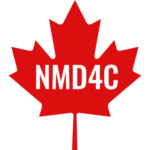This annual award program provides three awards, celebrating excellence and contribution to the neuromuscular field by neuromuscular researchers across both clinical and basic science streams.
Dr. Natasha Chang
Assistant Professor, McGill University and NMD4C Steering Committee Investigator
Early career investigators are at a stage in their careers where finding the funding and academic appointments to continue their research programs and clinical work is integral to their career progression in the field of neuromuscular care and research. These applications are highly competitive, and it is our hope that receiving an NMD4C award can help support and strengthen these applications to secure critical research funding and academic appointments.
By creating these awards, the NMD4C provides a method of recognizing outstanding achievement by early career neuromuscular researchers and clinicians on behalf of the Canadian neuromuscular community. Recipients receive a tangible accolade to bolster their academic CVs in pursuit of future academic appointments and grant applications. This award program is a part of the network's broader strategy to provide support for Canadian early-career neuromuscular investigators.
Award Categories
The three categories included in the competition are:
- Early Career Biomedical Researcher of the Year
- Early Career Clinical Researcher of the Year
- Publication of the Year
Eligibility Criteria
Researcher of the year award streams
- Early-career status: within five years of the date of their first independent research-related appointment (the eligibility window will be adjusted to take into account eligible leaves, as defined by CIHR).
- Member of NMD4C
- Self-nominations are accepted
- Previous award recipients are ineligible
Publication of the year award stream
- Any career stage
- Member of NMD4C
- Self-nominations are accepted
- Previous award recipients are ineligible
- Article published in the preceding year (November 2024 - present)
- First or last author of the article
Nomination Procedure
Researcher of the year award streams
If you wish to nominate yourself or an individual for this award, please complete the nomination form (please ensure all of the selection criteria have been addressed). You will need:
- The nominee’s contact information.
- The nominee’s biosketch (NIH OR CIHR format; 4-5 pages).
- Up to three research milestones of the nominee.
- A brief paragraph highlighting the achievements of the individual, and why you think they should receive the award.
Publication of the year award streams
To nominate yourself or an individual for this award, please complete the nomination form (please ensure all of the selection criteria have been addressed). You will require:
- The nominee’s contact information.
- The nominee’s biosketch (NIH OR CIHR format; 4-5 pages).
- Up to three research milestones of the nominee.
- A brief paragraph highlighting the achievements of the individual, and why you think they should receive the award.
- A PDF copy of the full publication you wish to nominate.
Selection Criteria
Researcher of the year award streams
Nominations will be evaluated by NMD4C’s committee using the following selection criteria:
- Research excellence (impact, originality, productivity).
- Research collaborations/ partnerships.
- Outreach and knowledge mobilization.
- Trainee Mentorship/ supervision.
- Open science.
- Patient engagement.
- Equity, Diversity, Inclusion, and Indigeneity (EDII).
Publication of the year award streams
Nominations will be evaluated by NMD4C’s committee according to the following selection criteria:
- Impact on the field.
- Quality of work.
- Originality/uniqueness.
- Outreach and knowledge mobilization.
- Open science.
- Patient engagement.
- Equity, Diversity, Inclusion, and Indigeneity (EDII).
Deadline
Nominations for the 2026 awards cycle have been extended till the 23rd of January 2026.
Applicants will be notified of outcomes in February 2026 and award recipients will be honoured at the 2026 NMD4C annual meeting.
Contact
For any Award related questions, please email our network manager, Erin Beattie
